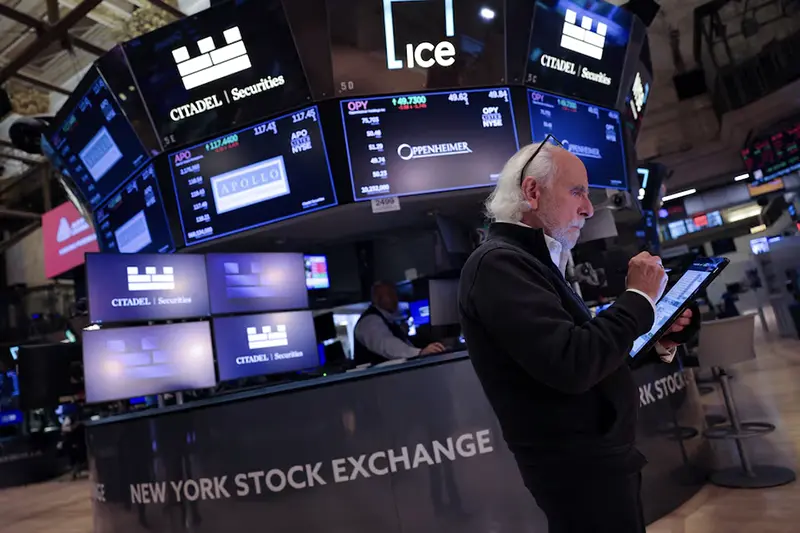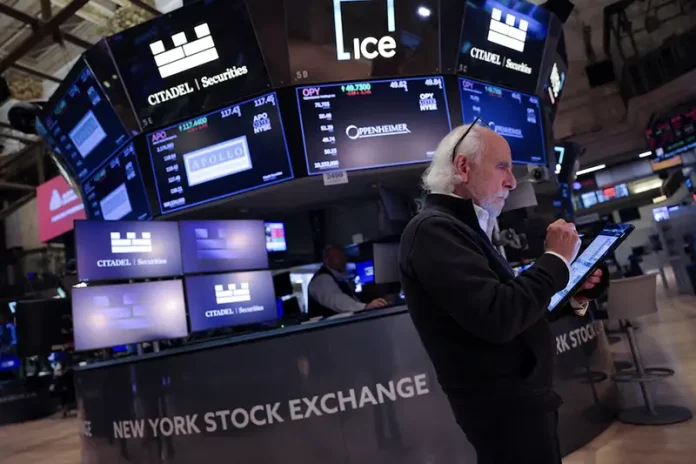September 19, 2024 – 7:16 AM PDT

(Reuters) – Wall Street rallied on Thursday with the S&P 500 hitting another intraday record high after the Federal Reserve kicked off its easing cycle with half-a-percentage point reduction and forecast more cuts were on the horizon.
Rate-sensitive growth stocks that have led much of this year’s rally rose. Microsoft (MSFT.O) added 2%, Tesla gained 4.2% and Apple (AAPL.O) advanced 2.6%.
Semiconductor stocks such as Nvidia (NVDA.O) rose 4.7%, while Advanced Micro Devices (AMD.O) gained 3.5% and Broadcom (AVGO.O) added 3.8%, sending the Philadelphia SE Semiconductor Index (.SOX) up 3.6%.
The Russell 2000 index (.RUT) also rose 1.7% with the broader market, as a lower interest environment could mean lower operating costs and greater profits for credit-dependent companies.
At 09:46 a.m., the Dow Jones Industrial Average (.DJI) rose 391.24 points, or 0.94%, to 41,894.34, the S&P 500 (.SPX) gained 72.37 points, or 1.29%, to 5,690.63 and the Nasdaq Composite (.IXIC) gained 377.68 points, or 2.15%, to 17,955.01.
Nine out of the 11 S&P 500 sectors gained, led by tech stocks (.SPLRCT) with a 2.8% rise, while utilities (.SPLRCU) were the biggest laggards.
After delivering its super-sized verdict on Wednesday, the Fed forecast rates to fall by another 50 bps by year-end and unveiled macroeconomic projections that analysts say reflect a goldilocks scenario, where growth is steady and inflation and unemployment stay low.
Data on the day showed jobless claims for the week ended Sept. 14 stood at 219,000, lower than economists’ estimates of 230,000.
“There’s a delayed reaction to the Fed’s rate cut … the claims came in low, so it’s only going to help fuel the idea that a soft landing is in play,” said Ross Mayfield, investment strategist at Baird.
“The guidance for plenty more cuts by the end of 2025 should open up (rate-sensitive) sectors to reengage and expand.”
Traders now see a 63.1% chance that the central bank will lower interest rates by 25 basis points at its November meeting, as per the CME Group’s FedWatch tool.
BofA Global Research now anticipates a total of 75 bps rate cuts by the end of this year, compared with 50 bps forecast earlier.
Market reaction in the aftermath of the decision was muted, with all the three indexes closing slightly lower in the previous session.
However, data going back to 1970 from Evercore ISI showed the S&P 500 has posted an average 14% gain in the six months following the first reduction of a rate-cutting cycle.
September has generally been a disappointing month for U.S. equities with the S&P 500 (.SPX) notching an average loss of 1.2% since 1928.
Bank of America (BAC.N) and Wells Fargo (WFC.N) advanced over 1% each after the big banks lowered their respective prime rates.
Citigroup (C.N) also rose 1.9%, sending the broader banks index (.SPXBK) 0.8% higher.
Among individual movers, fertility benefits management firm Progyny (PGNY.O) plunged 33% after a significant client notified the company it had elected to exercise a 90-day option to terminate its services agreement.
Advancing issues outnumbered decliners by a 5.27-to-1 ratio on the NYSE and by a 4.71-to-1 ratio on the Nasdaq.
The S&P 500 posted 47 new 52-week highs and no new lows, while the Nasdaq Composite recorded 100 new highs and 24 new lows.
Reporting by Johann M Cherian and Purvi Agarwal in Bengaluru; Editing by Nivedita Bhattacharjee and Maju Samuel


